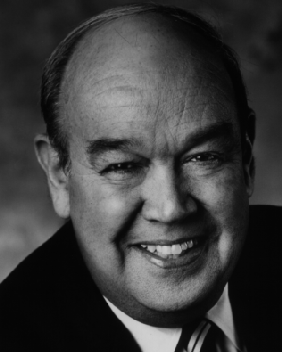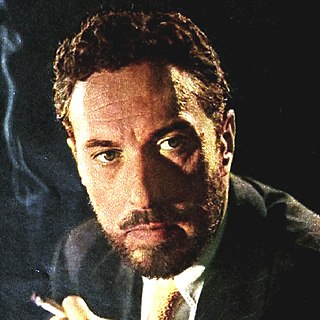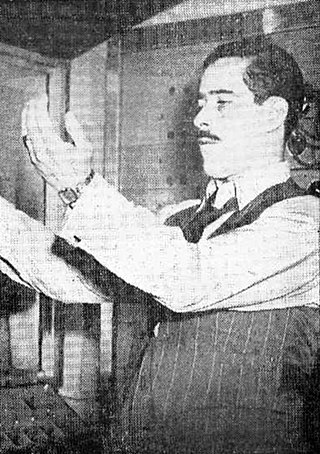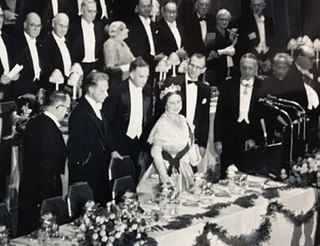
The Twilight Zone is an American media franchise based on the anthology television series created by Rod Serling in which characters find themselves dealing with often disturbing or unusual events, an experience described as entering "the Twilight Zone". The episodes are in various genres, including fantasy, science fiction, absurdism, dystopian fiction, suspense, horror, supernatural drama, black comedy, and psychological thriller, frequently concluding with a macabre or unexpected twist, and usually with a moral. A popular and critical success, it introduced many Americans to common science fiction and fantasy tropes. The first series, shot entirely in black-and-white, ran on CBS for five seasons from 1959 to 1964.
Gunsmoke is an American radio and television Western drama series created by director Norman Macdonnell and writer John Meston. It centered on Dodge City, Kansas, in the 1870s, during the settlement of the American West. The central character is lawman Marshal Matt Dillon, played by William Conrad on radio and James Arness on television.

This American Life (TAL) is a weekly hour-long American radio program produced in collaboration with Chicago Public Media and hosted by Ira Glass. It is broadcast on numerous public radio stations in the United States and internationally, and is also available as a free weekly podcast. Primarily a journalistic non-fiction program, it has also featured essays, memoirs, field recordings, short fiction, and found footage. The first episode aired on November 17, 1995, under the show's original title, Your Radio Playhouse. The series was distributed by Public Radio International until June 2014, when the program became self-distributed with Public Radio Exchange delivering new episodes to public radio stations.

CBS Radio Mystery Theater is a radio drama series created by Himan Brown that was broadcast on CBS Radio Network affiliates from 1974 to 1982, and later in the early 2000s was repeated by the NPR satellite feed. In New York City it was not aired by the then all-news WCBS but by its originating station, WOR, which produced and announced it as simply Radio Mystery Theater.

Charles Bishop Kuralt was an American television, newspaper and radio journalist and author. He is most widely known for his long career with CBS, first for his "On the Road" segments on The CBS Evening News with Walter Cronkite, and later as the first anchor of CBS News Sunday Morning, a position he held for fifteen years. In 1996, Kuralt was inducted into Television Hall of Fame of the National Academy of Television Arts & Sciences.

Irna Phillips was an American scriptwriter, screenwriter, casting agent and actress. She is best remembered for pioneering a format of the daytime soap opera in the United States geared specifically toward women. Phillips created, produced, and wrote several radio and television daytime serials throughout her career, including Guiding Light, As the World Turns, and Another World. She was also a mentor to several other pioneers of the American daytime soap opera, including Agnes Nixon, William J. Bell and Ted Corday.

John Charles Patrick Croghan Daly was an American journalist, host, radio and television personality, ABC News executive, TV anchor, and game show host, best known for his work on the CBS panel game show What's My Line?

Arnold Eric Sevareid was an American author and CBS news journalist from 1939 to 1977. He was one of a group of elite war correspondents who were hired by CBS newsman Edward R. Murrow and nicknamed "Murrow's Boys." Sevareid was the first to report the Fall of Paris in 1940, when the city was captured by German forces during World War II.

Father Knows Best is an American sitcom starring Robert Young, Jane Wyatt, Elinor Donahue, Billy Gray and Lauren Chapin. The series, which began on radio in 1949, aired as a television show for six seasons and 203 episodes. Created by Ed James, Father Knows Best follows the lives of the Andersons, a middle-class family living in the town of Springfield. The state in which Springfield is located is never specified, but it is generally accepted to be located in the Midwestern United States.

Fred W. Friendly was a president of CBS News and the creator, along with Edward R. Murrow, of the documentary television program See It Now. He originated the concept of public-access television cable TV channels.

Let's Pretend, created and directed by Nila Mack, was a CBS radio series for children. Prior to being renamed Let's Pretend, the program had a variety of titles and formats. In its most famous form, Let's Pretend, the Peabody Award-winning series ran from 1934 to 1954.

Lassie is an American television series that follows the adventures of a female Rough Collie dog named Lassie and her companions, both human and animal. The show was the creation of producer Robert Maxwell and animal trainer Rudd Weatherwax and was televised from September 12, 1954, to March 25, 1973, making it the eighth longest-running scripted American primetime television series. The show ran for 17 seasons on CBS before entering first-run syndication for its final two seasons. Initially filmed in black and white, the show transitioned to color in 1965.
The year 1954 saw a number of significant happenings in radio broadcasting history.

William Hannan Spier was an American writer, producer, and director for television and radio. He is best known for his radio work, notably Suspense and The Adventures of Sam Spade.

William N. Robson was an American director and producer of radio programs.
The Standard School Broadcast is a weekly educational radio program that went on the air in 1928 and promoted music appreciation for students in the western United States. It was the oldest educational radio program in America. Based in San Francisco, California, the series was carried on NBC radio stations and via syndication. The Standard School Broadcast was devoted to music and American history. Carmen Dragon was music director of the programs for many years. The program's sponsor, Standard Oil of California, was honored with a Peabody Award for the series in 1958. In 1975, the program received the Peabody Institutional Award "for 47 years of continuous educational radio service".
The Red Buttons Show premiered on the CBS television network on October 14, 1952, and ran for two years on that network, then moved to NBC for the final 1954–55 season.
Allan Everett Sloane was an American writer for radio and television who, over much of his career, explored the circumstances of people with special needs. He was significantly affected by the Hollywood blacklist.

The Columbia University Bicentennial was a series of celebrations in 1954 commemorating the 200th anniversary of the founding of Columbia University. Its scale was global, with participation from over 750 domestic and 350 foreign universities, libraries, and museums. In New York City, bicentennial events centered around three convocations in January, June, and October, interspersed with conferences, concerts, and other ceremonies. In order to spread the theme of the Bicentennial, "Man's Right to Knowledge and the Free Use Thereof", across the United States, the university created several network television and radio shows, including the Peabody Award-winning series Man's Right to Knowledge. The celebrations received heavy media coverage, both in the United States and abroad.
The Columbia Lectures in International Studies, also known as the Columbia Seminars in International Studies or as just the Columbia Seminars, was an educational television series of the early 1960s. It consisted of a series of half-hour broadcasts delivered by the faculty of Columbia University and prepared in cooperation with the university's School of International Affairs and Regional Institutes, with professors from other parts of the university also sometimes taking part. The series was produced by a commercial station, WNEW-TV Channel 5 in New York, and aired in early morning time slots on that station and others owned by Metromedia.
















